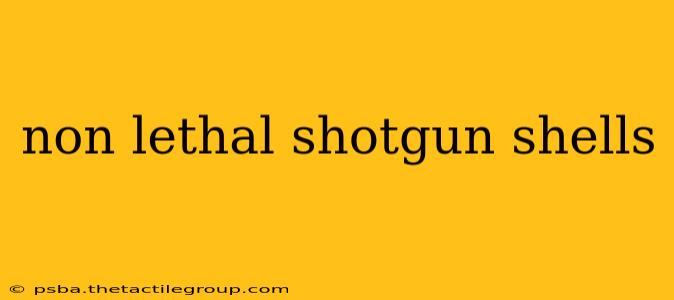Choosing the right ammunition is crucial for any responsible firearm owner. While lethal shotgun shells are commonly understood, the options for non-lethal alternatives are often less clear. This guide will delve into the various types of non-lethal shotgun shells available, their effectiveness, limitations, and legal considerations. Understanding these aspects is paramount to ensuring both safety and responsible use.
Types of Non-Lethal Shotgun Shells
Several types of non-lethal shotgun shells are designed to incapacitate a target without causing serious injury or death. The effectiveness of each varies considerably depending on factors such as range, target size, and the specific shell design.
1. Rubber Ball Rounds:
- Mechanism: These rounds contain rubber balls that are propelled from the shotgun. The impact force is intended to stun or incapacitate a target.
- Effectiveness: Effective at close range for stopping threats, but their effectiveness drastically decreases with distance. Accuracy is also a significant factor. Over-penetration is a concern, particularly with stronger gauge shotguns.
- Legal Considerations: Laws regarding the use of rubber ball rounds vary significantly by jurisdiction. Check local and state regulations before purchase and use.
2. Bean Bag Rounds:
- Mechanism: Bean bag rounds use fabric pouches filled with small lead shot, plastic pellets, or other materials. The impact force is intended to incapacitate the target.
- Effectiveness: Generally more effective than rubber balls for stopping power at closer ranges due to their larger surface area and mass. Still susceptible to reduced effectiveness with distance and requires precise aim.
- Legal Considerations: Similar to rubber ball rounds, legal restrictions apply. Local laws should be consulted before use.
3. Pepper Ball Rounds:
- Mechanism: These rounds contain a canister of concentrated oleoresin capsicum (OC), a chemical irritant commonly known as pepper spray. Upon impact, the canister bursts, releasing the irritant.
- Effectiveness: Highly effective at incapacitating targets due to the debilitating effects of OC. Range can be greater than rubber or beanbag rounds, but wind can affect accuracy.
- Legal Considerations: Use is governed by stringent regulations. Understanding and adhering to all local, state, and federal laws is crucial. Improper use can have serious legal repercussions.
4. Other Non-Lethal Options:
Some manufacturers produce other types of non-lethal shotgun shells, including those containing marking dyes or other less-than-lethal projectiles. Always research the specific product's capabilities and limitations before using it.
Factors to Consider When Choosing Non-Lethal Shotgun Shells
Several factors need careful consideration before selecting non-lethal shotgun shells:
- Range: How far do you need to engage a target? Different rounds have vastly different effective ranges.
- Target Size: The size and weight of the target influence the effectiveness of the round.
- Legal Restrictions: Always be aware of and comply with all local, state, and federal laws regarding the purchase, possession, and use of non-lethal ammunition.
- Environmental Factors: Wind, rain, and other weather conditions can greatly affect the accuracy and effectiveness of non-lethal rounds.
- Training: Proper training is essential for safe and effective use of any non-lethal shotgun ammunition. Seek professional instruction from qualified instructors.
Limitations and Potential Risks
It's critical to understand that even non-lethal shotgun shells are not without limitations and potential risks:
- Over-penetration: Especially with higher gauge shotguns, even non-lethal rounds can penetrate certain materials, posing a risk to unintended targets.
- Serious Injury: While designed to be non-lethal, misuse or unforeseen circumstances could result in serious injury.
- Malfunctions: As with any firearm ammunition, malfunctions can occur, requiring responsible handling and safety procedures.
Conclusion
Non-lethal shotgun shells provide a valuable tool for law enforcement and self-defense situations, offering an alternative to lethal force. However, careful consideration of the type of shell, effective range, legal restrictions, and potential risks is absolutely essential. Prioritizing safety and responsible use through proper training and understanding of all relevant factors is paramount. Always check local regulations before purchasing or using any non-lethal shotgun ammunition. This information is for educational purposes only and does not constitute legal or safety advice. Consult with relevant professionals for specific guidance.

